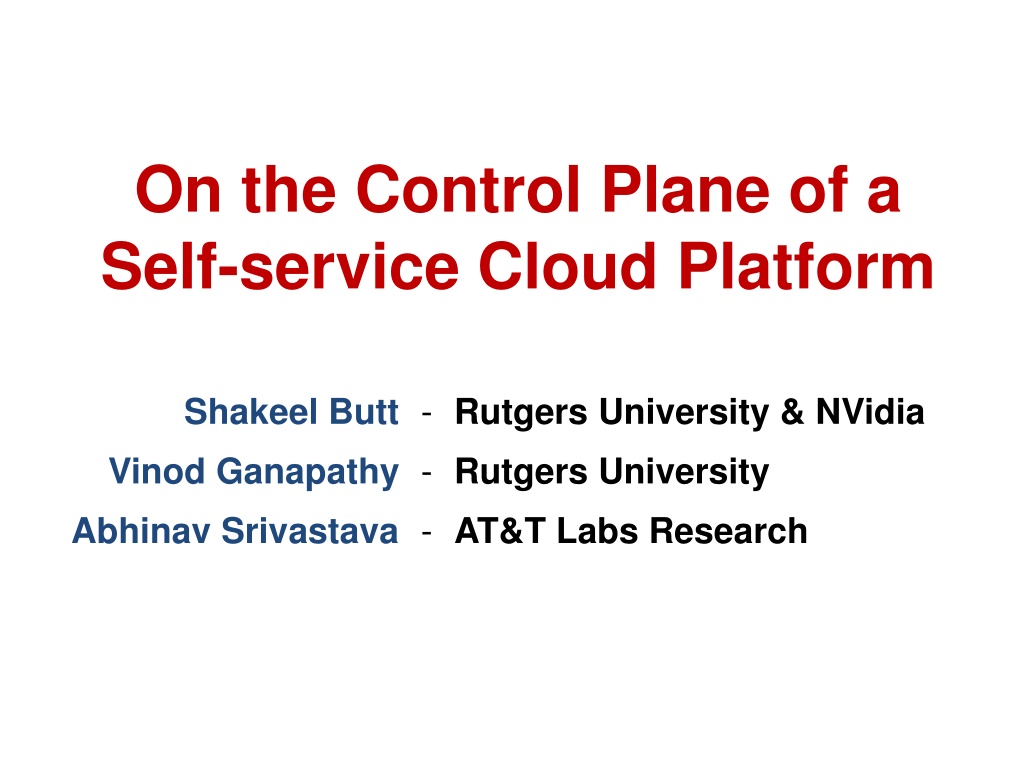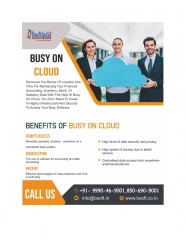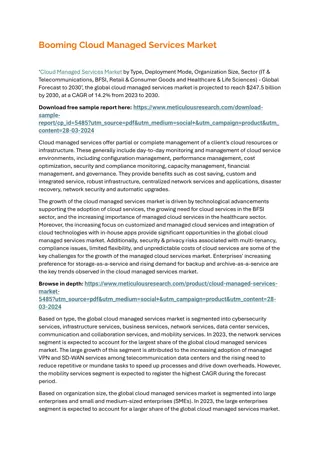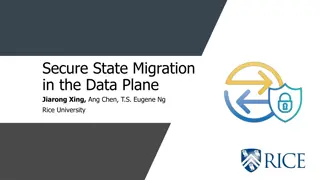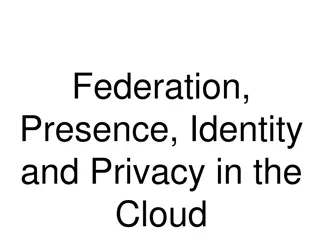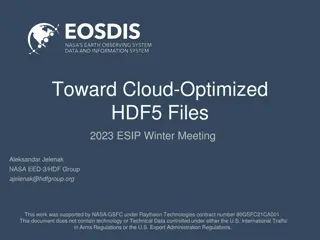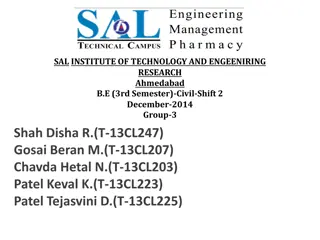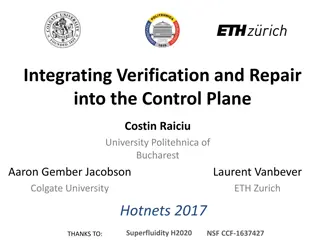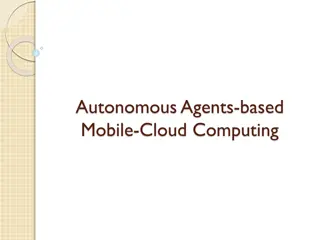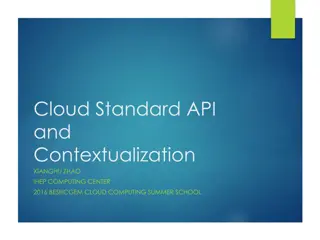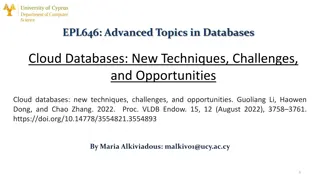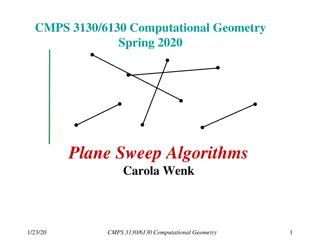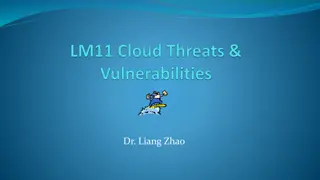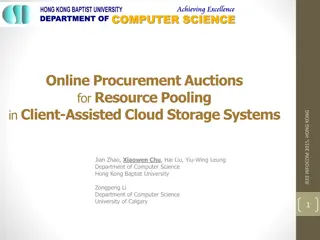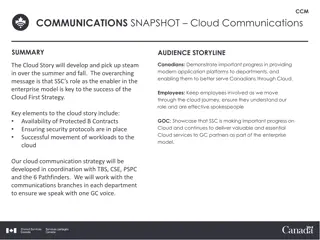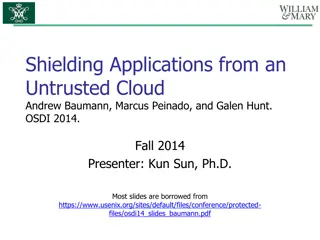Control Plane Security in Self-service Cloud Platforms
Exploring the risks and implications of client security on cloud platforms, this content discusses potential attacks, limitations in deploying services, and a proposed solution called SSC. The paper highlights the need for privilege separation and least privilege principles to enhance cloud security.
Download Presentation

Please find below an Image/Link to download the presentation.
The content on the website is provided AS IS for your information and personal use only. It may not be sold, licensed, or shared on other websites without obtaining consent from the author. Download presentation by click this link. If you encounter any issues during the download, it is possible that the publisher has removed the file from their server.
E N D
Presentation Transcript
On the Control Plane of a Self-service Cloud Platform Shakeel Butt - Rutgers University & NVidia Vinod Ganapathy - Rutgers University Abhinav Srivastava - AT&T Labs Research
Client security on cloud platforms Cloud providers and administrators are all powerful. Clients have little choice but to trust them. 2
Implications Attacks Client data exposed to attack Malicious attacks perpetrated by employees: Insider attacks by cloud provider s employees Cited as important concern in [Gartner 2008] Exploits against cloud admin interfaces: Plethora of examples: CVE-2007-4993, CVE- 2007-5497, CVE-2008-0923, CVE-2008-1943, CVE-2008-2100, 3
Implications Deploying services Clients have limited flexibility Cloud clients largely restricted to in-VM security tools Deployment and configuration of powerful security tools entrusted to cloud provider: VM introspection tools Network-level middleboxes 4
Our Solution SSC [ACM CCS 2012] Self-service Cloud Computing De-privilege cloud admins Transfer privilege to clients Main ideas: Privilege separation Least privilege Implemented via hypervisor modifications 5
Contributions of this paper Control plane for a cloud platform consisting of SSC hypervisors Client s Perspective Provider s Perspective Deploying custom network middleboxes Unified administrative interface Specifying VM dependencies VM dependency-aware migration 6
Traditional cloud platforms Provider s Management VM (dom0) Client VM Client VM Client VM Hypervisor Hardware 7
Privilege allocation Provider s Management VM (dom0) Client VM Client VM Client VM Hypervisor Hardware 8
Example: Malware detection Management VM Client s VM Checking daemon Data Code 2 Process the page Sec. Policy ? 3 1 Resume guest Alert user Hypervisor 9
Flexibility Problem Clients rely on provider/admins to deploy the service Management VM Client s VM Checking daemon Data Code 2 Process the page Sec. Policy ? 3 1 Resume guest Alert user Hypervisor 10
Security Problem Client code & data secrecy and integrity vulnerable to attack Management VM Client s VM Checking daemon Data Code 2 Process the page Sec. Policy ? 3 1 Malicious cloud operator Resume guest Alert user Hypervisor 11
Privilege allocation in SSC Provider s Management VM Client Mgmt. VM Client VM Client VM SSC Hypervisor Hardware 12
Duties of the management VM Manages and multiplexes hardware resources Manages client virtual machines Management VM (Dom0) 13
Main technique used by SSC Disaggregate the management VM SDom0 UDom0 Manages hardware No access to client VMs Manages client s VMs Allows clients to deploy new services System-wide Mgmt. VM (one per physical host) Per-Client Mgmt. VM 14
An SSC platform SDom0 Work VM VM VM Work UDom0 UDom0 UDom0 Security Work VM VM Work VM Work SSC Hypervisor Hardware Trusted Computing Base 15
Cloud control plane Node controller (in Sdom0) Node controller (in Sdom0) Controller Node Client VM Client VM Cloud Controller Dom0 Udom0 Udom0 Hypervisor Client s interface to the cloud Client VM images 16
Cloud control plane From the client s perspective: Interfaces with the client to get VM images Is the client s administrative interface From the cloud provider s perspective: Manages VM placement and migration Abstracts away platform details, hiding them from the client s view 17
Need for an SSC control plane Traditional control plane software unaware of SSC abstractions Two implications: 1. Poor flexibility: Client cannot specify VM dependencies Client cannot specify middlebox placement 2. Poor security: Udom0s on individual platforms may expose cloud provider topology to malicious clients 18
SSC-aware control plane Enhanced dashboard interface to abstract details of individual Udom0s Allows specification of: VM dependency constraints Middlebox placement topologies Transparently handles VM migration and placement Please see paper for details on our VM migration protocol 19
SSC-aware control plane Node controller (in Sdom0) Node controller (in Sdom0) Controller Node Client VM switches UDom0 Client Cloud Controller Sdom0 Udom0 Udom0 SSC Hypervisor Client s interface to the cloud Client VM images 20
Client interface 1 Node controller (in Sdom0) Node controller (in Sdom0) Controller Node Client VM switches UDom0 Client Cloud Controller Sdom0 Udom0 Udom0 SSC Hypervisor 1 Client s interface to the cloud Client VM images 21
Example scenario Web Server (web_vm) 22
Example scenario MUST_COLOCATE MUST_COLOCATE VMI tool (vmi_vm) Web Server (web_vm) 23
Example scenario MUST_COLOCATE MUST_COLOCATE MUST_COLOCATE MUST_COLOCATE SSL Proxy (ssl_vm) VMI tool (vmi_vm) Web Server (web_vm) 24
Example scenario MUST_COLOCATE MUST_COLOCATE MUST_COLOCATE MUST_COLOCATE SSL Proxy (ssl_vm) VMI tool (vmi_vm) Web Server (web_vm) MAY_COLOCATE MAY_COLOCATE Firewall (firewall_vm) 25
VM dependency constraints VM web_vm; // Client s Web server VM vmi_vm; // VMI-based Memory introspection tool VM ssl_vm; // SSL proxy for the Web server VM firewall_vm; // VM running the Snort NIDS web_vm.name = MyWeb ; web_vm.image = Apache.img; vmi_vm.name = ...; vmi_vm.image = ...; ssl_vm.name = ...; ssl_vm.image = ...; firewall_vm.name = ...; firewall_vm.image = ...; Grant_Privilege (vmi_vm, web_vm, Kern_Mem); Set_Backend (ssl_vm, web_vm, NET, MUST_COLOCATE); Set_Backend (firewall_vm, ssl_vm, NET, MAY_COLOCATE); 26
Cloud controller 2 2 Node controller (in Sdom0) Node controller (in Sdom0) Controller Node Client VM switches UDom0 Client Cloud Controller Sdom0 Udom0 Udom0 SSC Hypervisor Client s interface to the cloud Client VM images 27
Cloud controllers tasks 2 Solves a constraint-satisfaction problem All MUST_COLOCATE constraints satisfied Output is a set of VM placements Communicates VM placements to individual node controllers Sends network switch configurations for backend VMs (Set_Backend) Also sends permission requirements for VMs (Grant_Privilege) 28
Udom0 and switches 3 switches3 Node controller (in Sdom0) Node controller (in Sdom0) Controller Node Client VM UDom0 Client Cloud Controller Sdom0 Udom0 Udom0 SSC Hypervisor Client s interface to the cloud Client VM images 29
Udom0 and switches 3 Each physical host that runs a client VM has a Udom0 and software switches We use Open vSwitch for switches Udom0 handles Grant_Privilege requests, and enables system services Software switches configured to handle Set_Backend requests and accommodate middleboxes 30
Example of middlebox placement Host B Host A Inbound traffic Open vSwitch VM Open vSwitch VM ssl_vm firewall_vm web_vm Traffic scanned by firewall_vm 31
Evaluation Goals Measure overhead of control plane components Dell PowerEdge R610 running Xen-4.3 24 GB RAM 8 Xeon cores with dual threads (2.3 GHz) Each VM has 2 vCPUs and 2 GB RAM Results shown only for one case study See our paper for more 32
Baseline overhead for middleboxes SAMEHOST Ping requests Measurement host Middlebox Client VM DIFFHOST Open vSwitch Open vSwitch Measurement host Client VM Middlebox 33
Baseline overhead for middleboxes SAMEHOST Setup Traditional SSC Throughput (Mbps) 925.4 0.5 924 1.2 RTT (ms) 0.38 0.62 (1.6x) DIFFHOST Setup Traditional SSC Throughput (Mbps) 848.4 11.2 425.8 5.5 RTT (ms) 0.69 1.6 (2.3x) 34
Example: Network metering Open vSwitch Open vSwitch Open vSwitch Open vSwitch Metering Client VM Client VM Client VM 35
Network metering overhead SAMEHOST Setup Traditional SSC Throughput (Mbps) 924.8 1.1 924 0.4 DIFFHOST Setup Traditional SSC Throughput (Mbps) 845.4 11.1 424.3 3.1 36
See paper for more Network intrusion detection Network access control Host+network (hybrid) intrusion detection Evaluation of VM migration overheads 37
Related work Client security: CloudVisor [SOSP 11], Xoar [SOSP 11], Intel SGX, Haven [OSDI 14], Overshadow [ASPLOS 08] Client flexibility with nested VMs: XenBlanket [EuroSys 12] Client-controlled middleboxes with SDN: SIMPLE [SIGCOMM 13], FlowTags [NSDI 14], CloudNaaS [SOCC 11] 38
Thank You. Shakeel Butt - shakeelb@cs.rutgers.edu Vinod Ganapathy - vinodg@cs.rutgers.edu Abhinav Srivastava - abhinav@research.att.com
SSC versus Haven/Intel SGX SGX allows clients to create enclaves, which are opaque to cloud providers Benefits of Intel SGX over SSC: Cloud provider is untrusted Ability to defend against memory snooping Strong, cryptographic security guarantees Benefits of SSC over Intel SGX: Mutually-trusted domains allow provider to monitor client Mimics cloud setting of VMs over hypervisors 41
Cloudvisor and XenBlanket CloudVisor [SOSP 11] Xen-Blanket [EuroSys 12] Protect client VM data from Dom0 using a thin, bare- metal hypervisor Allow clients to have their own Dom0s on commodity clouds using a thin shim Client VM Client Dom0 Client VM Dom0 Cloud Dom0 XenBlanket Nested Hypervisor CloudVisor Cloud Hypervisor 42
Providers want some control NO NO data leaks or corruption illegal activities or botnet hosting Client Cloud Provider Udom0 and service VMs put clients in control of their VMs Sdom0 cannot inspect these VMs Malicious clients can misuse privilege Mutually-trusted service VMs 16
Traditional privilege model Privileged operation Hypervisor is request from Management VM? YES NO ALLOW DENY 44
SSCs privilege model Privileged operation Self-service hypervisor Is the request from client s Udom0? YES NO Does requestor have privilege (e.g., client s service VM) NO YES ALLOW ALLOW DENY 45
